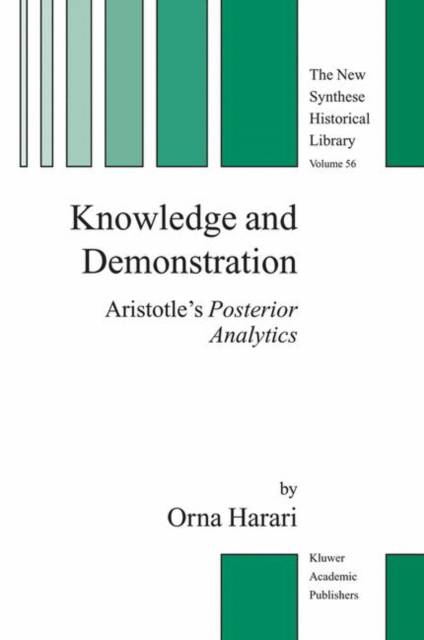
Door een staking bij bpost kan je online bestelling op dit moment iets langer onderweg zijn dan voorzien. Dringend iets nodig? Onze winkels ontvangen jou met open armen!
- Afhalen na 1 uur in een winkel met voorraad
- Gratis thuislevering in België vanaf € 30
- Ruim aanbod met 7 miljoen producten
Door een staking bij bpost kan je online bestelling op dit moment iets langer onderweg zijn dan voorzien. Dringend iets nodig? Onze winkels ontvangen jou met open armen!
- Afhalen na 1 uur in een winkel met voorraad
- Gratis thuislevering in België vanaf € 30
- Ruim aanbod met 7 miljoen producten
Zoeken
Omschrijving
This study explores the theoretical relationship between Aristotle's theory of syllogism and his conception of demonstrative knowledge. More specifically, I consider why Aristotle's theory of demonstration presupposes his theory of syllogism. In reconsidering the relationship between Aristotle's two Analytics, I modify this widely discussed question. The problem of the relationship between Aristotle's logic and his theory of proof is commonly approached from the standpoint of whether the theory of demonstration presupposes the theory of syllogism. By contrast, I assume the theoretical relationship between these two theories from the start. This assumption is based on much explicit textual evidence indicating that Aristotle considers the theory of demonstration a branch of the theory of syllogism. I see no textual reasons for doubting the theoretical relationship between Aristotle's two Analytics so I attempt to uncover here the common theoretical assumptions that relate the syllogistic form of reasoning to the cognitive state (i. e., knowledge), which is attained through syllogistic inferences. This modification of the traditional approach reflects the wider objective of this essay. Unlike the traditional interpretation, which views the Posterior Analytics in light of scientific practice, this study aims to lay the foundation for a comprehensive interpretation of the Posterior Analytics, considering this work from a metaphysical perspective. One of my major assertions is that Aristotle's conception of substance is essential for a grasp of his theory of demonstration in general, and of the role of syllogistic logic in particular.
Specificaties
Betrokkenen
- Auteur(s):
- Uitgeverij:
Inhoud
- Aantal bladzijden:
- 162
- Taal:
- Engels
- Reeks:
- Reeksnummer:
- nr. 56
Eigenschappen
- Productcode (EAN):
- 9781402027871
- Verschijningsdatum:
- 2/11/2004
- Uitvoering:
- Hardcover
- Formaat:
- Genaaid
- Afmetingen:
- 160 mm x 241 mm
- Gewicht:
- 376 g

Alleen bij Standaard Boekhandel
+ 307 punten op je klantenkaart van Standaard Boekhandel
Beoordelingen
We publiceren alleen reviews die voldoen aan de voorwaarden voor reviews. Bekijk onze voorwaarden voor reviews.











